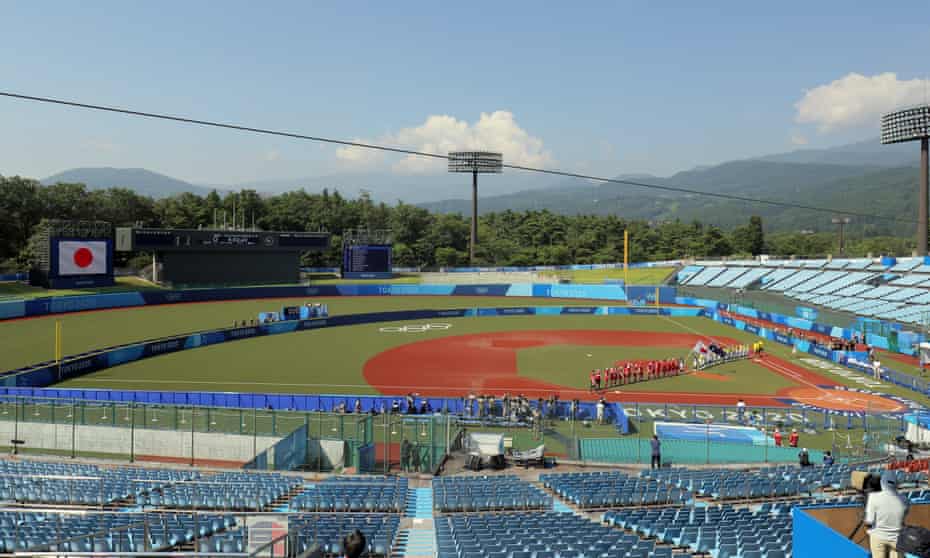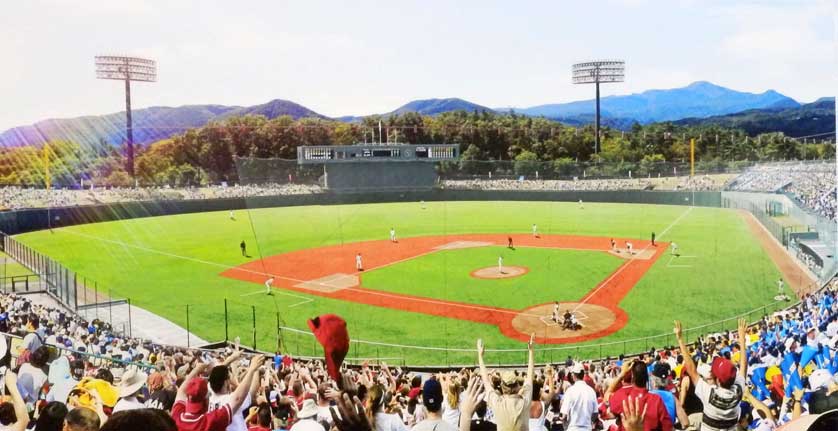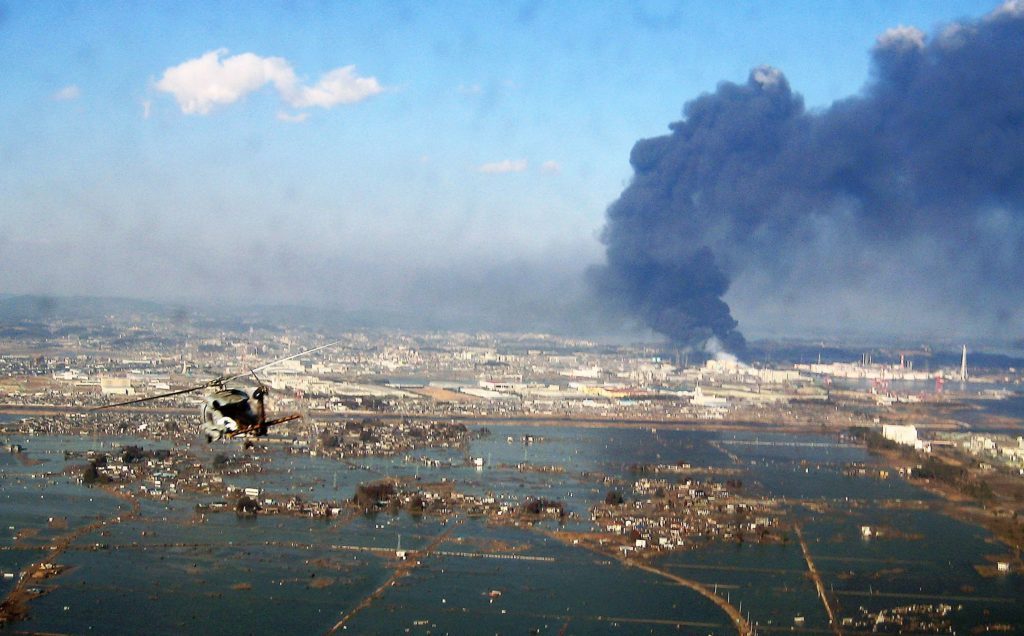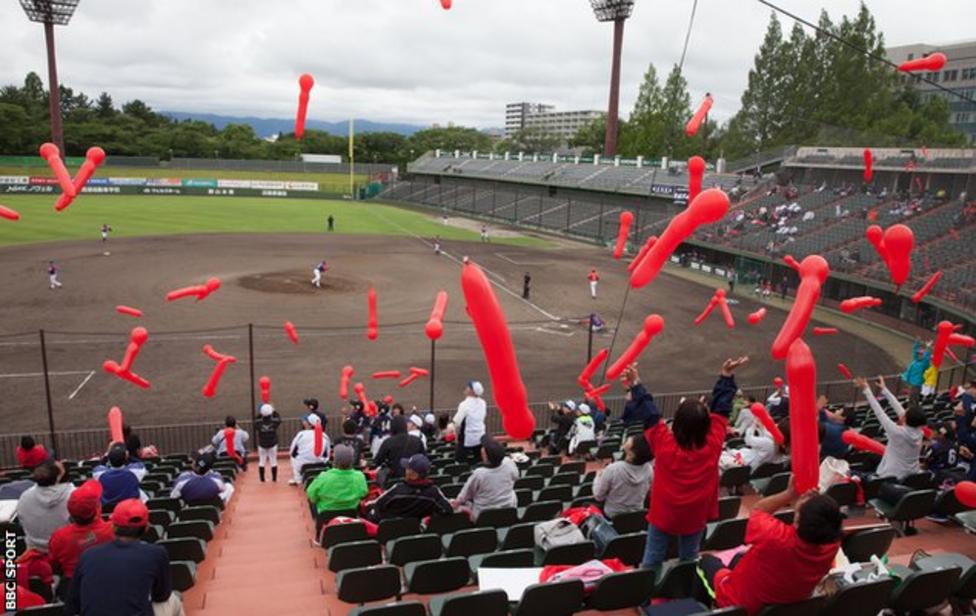
The Opening Ceremonies of the 2020 Olympics may have occurred in Tokyo on July 23, 2021, but the games actually began two days earlier and about 300 kilometers north. On July 21, 2021, at Fukushima Azuma Baseball Stadium, the host nation, (and eventual gold medal winner) Japan, defeated Australia 8-1in softball. Azuma then played host to the opening baseball game on July 28; Japan again prevailed, in an exciting, come-from-behind 4-3 win over the Dominican Republic.
The selection of this remote ballpark to open the games honors a long process of recovery and healing for Fukushima. 2021 marks the tenth anniversary of the devastating earthquake and ensuing tsunami and nuclear meltdown that wreaked havoc on the region and took approximately 20,000 lives. While the news cycle long moved away from this disaster, the tragedy still weighs heavy on Fukushima and the surrounding area, as the utter destruction and fears of long-term nuclear radiation still leave over 200,000 displaced residents.
Last year, we published our rankings of the Nippon Professional Baseball stadiums, from the lowest (Nagoya Dome) to the highest (Koshien Stadium). In that article, we claimed that Hotto Motto Field in Kobe – the former home of the Orix BlueWave and sometimes-home to the Hanshin Tigers – is the best alternate NPB stadium to catch a game.
But now, a new ballpark must be considered: Fukushima Azuma Baseball Stadium. The refurbished stadium in a beautiful setting serves as an alternate home site for the Yakult Swallows and Yomiuri Giants and the permanent home of the Fukushima Red Hopes of the independent Baseball Challenge League.
What does this stadium have to offer from a baseball and cultural perspective? Keep reading to find out.
Fukushima Azuma as a Stadium

With a seating capacity between 14,000 and 18,000, Azuma is not the biggest stadium for an international stage. For comparison, Yokohama Stadium – the other host for Olympic baseball and softball – seats 35,000. What Azuma lacks in size, however, it makes up for in intimacy and viewpoints.
Let’s start with the latter: the sightlines are fantastic. With grassy picnic seating beyond the outfield fence and a green canopy of trees beyond that, Azuma offers unparalleled views. Of course, there may be some nitpickers that point out the vast foul territory, but we’d argue that only adds to the stadium’s old-school charm.
Wondrous sightlines aside, Azuma offers a unique Japanese baseball experience of NPB “countryside games.” Legendary media personality Wayne Graczyk took in a Yomiuri game at Azuma stadium in 2008 and wrote that the mighty Giants’ use of the remote stadium was a tradition dating back to the infantile days of professional baseball in Japan.
“Known as chiho jiai in Japanese, these games have been part of pro baseball history and culture in this country since the early days, having been played in the 1930s prior to World War II before franchises with specific home cities and stadiums were organized,” Graczyk writes. “The players would make stops along the way for games in towns such as Shizuoka and, 70 years later, even with the speedy modern transportation, the tradition of the countryside games continues.”
Graczyk also notes multiple quirks of attending a game in Fukushima, including staffing concessions with local citizens and honoring players from the countryside region with pregame ceremonies and flowers. The countryside games, he notes, “have their charm, local color, and regional food specialties.” As a result, any NPB games played this way are must-see action for locals and a bucket-list item for all Japanese baseball fans.
For Olympic baseball and all of Japan, however, the stadium’s use means something much more.
Fukushima Azuma as a Landmark

On March 11, 2011, the Fukushima Daiichi Nuclear Power Plant was the site of the most severe nuclear accident since Chernobyl, caused by the most powerful earthquake in Japan’s recorded history and the deadly tsunami that followed. A nuclear meltdown and the release of radioactive material led to the evacuation of 154,000 Tohoku citizens. The disaster led to anxieties and about what the future may look like for the region, and whether there ever would be a return to “normal.”
And yet, life went on for the resilient citizens of Fukushima. While the center of the meltdown was still off-limits, people noted warnings of radiation and pushed on through normal routines as much as possible, maybe staying inside a little longer than usual. While the long-term results of the meltdown are still to be determined, today, Fukushima largely appears as it was before. Despite this, the region has remained shunned by both international tourism and the Japanese economy, as both markets refused to engage with Fukushima out of radiation fears, according to the New York Times.
The community is trying to extinguish those fears with the power of sports.
The stadium sits 42 miles northwest of the nuclear plant site – well outside of any formal radiation danger zone. It even hosted NPB games later that same year of the disaster. Graczyk attended these games and reported that nothing seemed out of place, even noting that far fewer fans were wearing surgical masks than he’d expected.
Swallows slugger Wladimir Balentien said about playing in the region, “I guess it is safe, or we would not be here, and I hope by playing here, we can help lift the spirits of the people in this area by showing them some good baseball.”
The stadium is home to the Fukushima Red Hopes of the independent Baseball Challenge League. Their manager and team president, Akinori Iwamura, earned fame in two leagues, winning six gold gloves and three times being named an All-Star for the Tokyo Yakult Swallows, and then helping the Tampa Bay Rays win their first-ever American League pennant in 2008.

The Red Hopes were founded just three years after the disaster and began playing with a simple goal in mind: change the perception around the city and region. Iwamura, who already was a national hero of sorts for helping Japan to World Baseball Classic titles in 2006 and 2009, understood this well when he took the job, thinking himself a “missionary” of sorts to bring hope to the city and revitalize its image.
“People living in Fukushima have suffered the most. It’s almost as if they are being treated as wrong-doers. The rumors are terrible,” he told the Kyodo News. “Some evacuee children have been bullied in the towns they’ve been relocated to. That is the most intolerable.” In a New York Times article, he added, “Even though it’s a negative way many people know the name of Fukushima, we have to change it into a positive way.”

Baseball has long been a reflection of the state of affairs in Japan. We’ve mentioned previously how star ballplayers fought for their nation in World War II – most notably Eiji Sawamura, namesake of the top NPB pitcher award – and how the Hiroshima Carp rose from the ashes of an atomic bomb. The sport’s return to a devastated region marks the resiliency of not just the area, but also athletics heroes. The return of baseball to Fukushima is yet another example of how baseball is crucial to Japan’s identity.
As a result, it should come as no surprise that Azuma stadium, rather than one of the more iconic epicenters of Japanese baseball, such as the Tokyo Dome or Koshien Stadium – was chosen to showcase the sport’s return to the Olympics for the first time since 2008. “By hosting Olympic baseball and softball events, Fukushima will have a great platform to show the world the extent of its recovery in the ten years since the disaster,” Tokyo 2020 President Yoshiro Mori said of the decision.
“It’s a chance to show that Fukushima has become vibrant again,” Koki Unami, a fan of the Red Hopes, told the Kyodo News. “I wonder how foreign people will view us. I want the place to be packed with foreign visitors, so that people will see we are doing well, and that they tell others. I’m excited to have the games here.”
While it may not have the tourism impact Fukushima was hoping for due to the Games being closed to fans, Azuma Stadium still shined as audiences worldwide watched 2020 Olympic baseball and softball, played to the backdrop of this gorgeous stadium.
The Fukushima Azuma Baseball Stadium not only represented the region and the host nation as the 2020 Olympic Games commenced in Tokyo; it stands as a symbol of a period of rebirth for the region. The Games turned the attention of millions of eyes from around the globe toward the Japanese countryside for a glimpse at the healing power of baseball – for a region, for a nation, for the world.